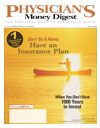Publication
Article
Physician's Money Digest
Find Investment Value with Municipal Bonds
Author(s):
Value and safety are two of the most desirablequalities of an investment vehicle. The overallinvestment profile of a high-net-worthinvestor, however, usually reflects some degree of riskin the form of equity positions, real estate holdings,or even ownership in a small business. In order toachieve financial balance in this potential volatileportfolio, municipal bonds are good candidates to beincluded among a physician-investor's assets.
In the current interest rate environment representedby a relatively flat yield curve, municipal bonds reflectsignificant value, yet offer both a federal tax exemptionand state tax exemption for state residents.Additionally, the somewhat flat yield curve allowsinvestors to get the same interest earnings over a shortermaturity range with reduced market volatility in theevent of rising interest rates. The current environmentfor municipal bond investment also allows for high relativecredit quality while still earning good returns.
The following categories of municipal bonds offercapital preservation and safety:
•General obligation bonds. The allure of generalobligation bonds is that they are secured by thefull faith and credit of the municipality. They carrythe lowest instances of rates of default, and a bondholdercan sue a municipality to force it to raise revenuesto make up for any debt service payment shortfalls.Since all municipalities are not created equal, animportant factor in considering general obligationbonds as an investment would be location.
•Essential service revenue bonds. Essentialservice revenue bonds are issued by municipal enterprisessuch as water and sewer utilities. The enterpriseusually has no competition within its service area andhas the attributes of a monopoly. Essential service revenuebonds are paid from revenues generated by theenterprise after payment of operating and maintenanceexpenses. A fund equal to a year's worth ofprincipal and interest is also pledged to bond repayment.All essential service enterprises have a need forproactive management to assure efficient enterpriseoperations. Bond ratings always take this factor intoaccount and, therefore, higher-rated enterprise bondsare safe investments.
•Dedicated tax revenue bonds. Dedicated taxrevenue bonds are issued by municipalities to diversifydebt issuance away from general obligation debt. Thebonds are paid from a first lien on a specific tax, usuallya personal income or sales tax. The dedicated taxrevenue base is usually very large and receipts providemultiple coverage levels of principal and interest.Based on debt service coverage, these bonds are frequentlyrated higher than general obligation bonds butoften provide slightly higher interest rate payments.
•Insured municipal bonds. Since more thanhalf of municipal debt is insured by various bondguarantors, it is important to review the positiveaspects of insured debt as part of a municipal andoverall investment portfolio. Insured bonds are ratedTriple-A but it is important to view bond insuranceas a credit enhancement, not as a standalone securityfeature, as the rating of the issuer is important. In thecurrent market environment, buying insured bondswith good underlying credit ratings works out verywell. They often trade with the same yield as uninsuredhigher rated bonds having the same maturity.
High-net-worth investors should view highly ratedor insured municipal bonds as a relatively worthwhileinvestment. Diversifying into essential service bondsand dedicated tax bonds as well as general obligationbonds provides above-average security and maximizationof high-quality tax-free yields.
Stuart Bromberg is managing director and head of municipalresearch at New York-based Samuel A. Ramirez & Company, afull-service boutique investment bank with offices across thecountry. Their wealth management division provides portfoliomanagement and financial and estate planning for high-net-worthindividuals, overseeing about $2 billion in assets.
